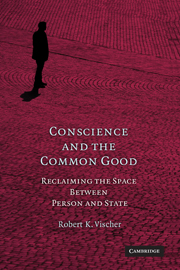3 - Conscience's Claims
Published online by Cambridge University Press: 05 June 2012
Summary
Most students of the human condition today have rejected a belief in conscience as a deposit of absolute and universal moral truth. At the same time, most will intuitively resist the suggestion that conscience is just another expression of personal preference. Exempting Daniel Seeger from the draft remains a troubling proposition for some because of the difficulty in discerning a principled distinction between his justification for not fighting the war and the countless reasons offered by other conscripts as to why they would rather not fight. One popular attempt to draw a distinction is to dress up preference as conscience by focusing on the intensity of one's preference. But the distinction cannot turn on the depth of feeling behind Seeger's opposition to combat. Requests for exemption such as “I don't want to die” or “I don't want to leave my family” could have at least as much depth of feeling as Seeger's claim.
If the scope of conscientious objector status is tied to the personal cost stemming from the request's denial, there is no apparent reason to dismiss the cost faced by those whose preferred life plans did not include military combat. For purposes of conscience, the cost cannot be measured in terms of undesired outcomes. There is a different sort of cost in terms of coerced participation in conduct that is wrong – not just unpleasant or unwelcome, but wrong.
- Type
- Chapter
- Information
- Conscience and the Common GoodReclaiming the Space Between Person and State, pp. 73 - 97Publisher: Cambridge University PressPrint publication year: 2009



